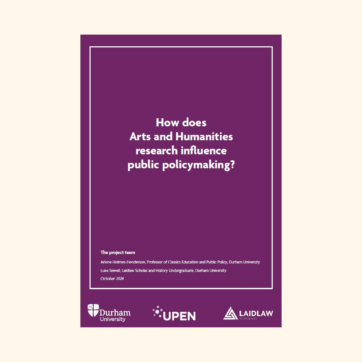“We’ve been working hard to make it easier to bring academic research and evidence into local policymaking in order to benefit the people living in the city of Leeds. Over the last few years we’ve developed an innovative model, using Areas of Research Interest, to provide a way for Leeds City Council to communicate its knowledge needs to researchers at the University of Leeds and elsewhere.
This case study is a reflection on the approach Leeds has taken in strengthening the research-policy collaborations in the city. As anchor institutions, Leeds City Council and the University of Leeds are committed to working in partnership to drive the city’s sustainability, prosperity, social inclusivity, health and well-being.” Abi Rowson, Research Manager.
The case study reveals how the two institutions have been building on an already strong civic partnership, to develop a more strategic research collaboration. Having had many successful research partnerships in the past, across a wide range of topics and disciplines, there was a drive to do more for the city. As a result, goals were agreed to increase the number and diversity of researchers working with the local authority and to create a new entry point for conversations about priority policy areas, encouraging new research collaborations to flourish. They also wanted a mechanism that would better align existing research evidence with the Council’s knowledge needs to support more informed policy development and decision-making.
The mechanism in question, used to bring academic and policy organisations together, was the ‘Areas of Research Interest’, or ‘ARI’. This approach made Leeds was one of the first cities to trial Areas of Research Interest at a local authority level. The case study offers some reflections on the outcomes and benefits that this model brings, along with the challenges and hurdles that were faced in establishing an approach in previously untested waters.
It is hoped that the case study will be useful for both academic institutions and policy organisations who might be considering using a similar approach. It includes:
- a summary of key features of the Leeds City Council ARI;
- an overview of the journey to date;
- six key takeaways from what Leeds has learned in putting this approach in place;
- a summary of the benefits that have been derived and how progress is evaluated;
- a reflection on the factors that have enabled this approach;
- some questions for the future and what next for this work;
- and links to other helpful resources.
“We have received a large amount of interest from colleagues wanting to use this model elsewhere in the country and at different policy levels. We are also working with our friends and colleagues in Yorkshire and Humber Policy Engagement and Research Network (Y-PERN) about how to transfer and scale up in the Yorkshire and Humber region, and specifically, how a mayoral combined authority could build on the lessons that we have learned. In addition, the Universities Policy Engagement Network (UPEN) offers a forum for considering how ARI can work in a devolved UK picture, and how ARI at different levels of government can intersect and support each other.” Abi Rowson
Abi invites researchers, knowledge mobilisers or policy professionals to reach out if they would like to know more.
Read the UPEN case study in full.


